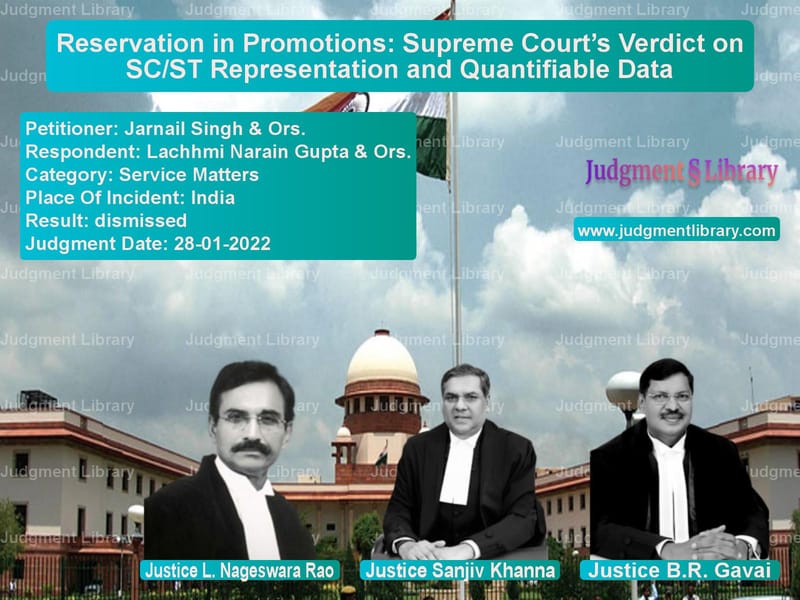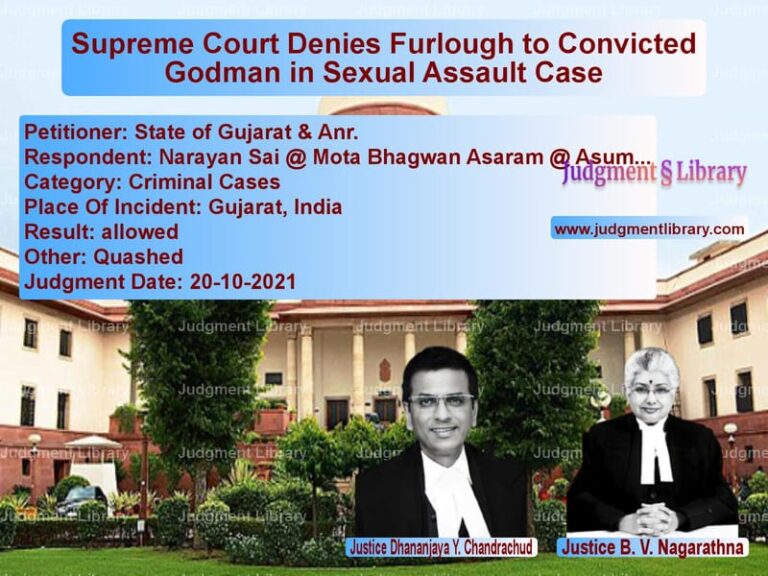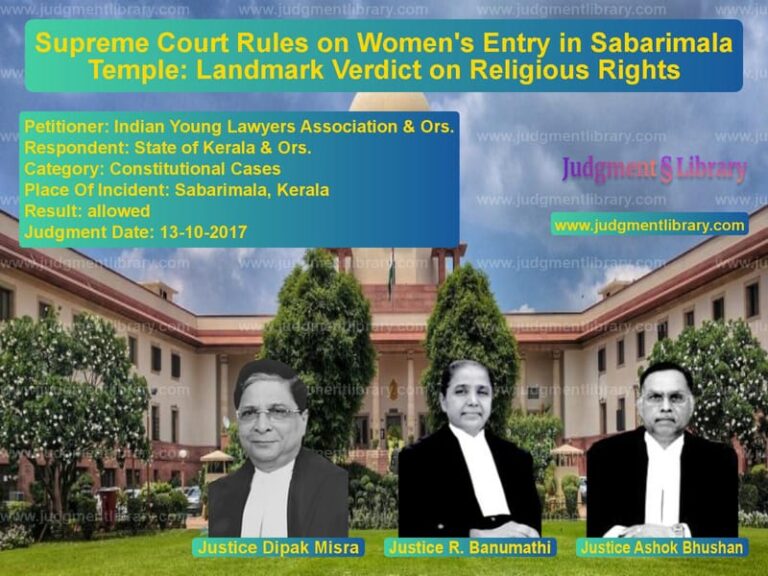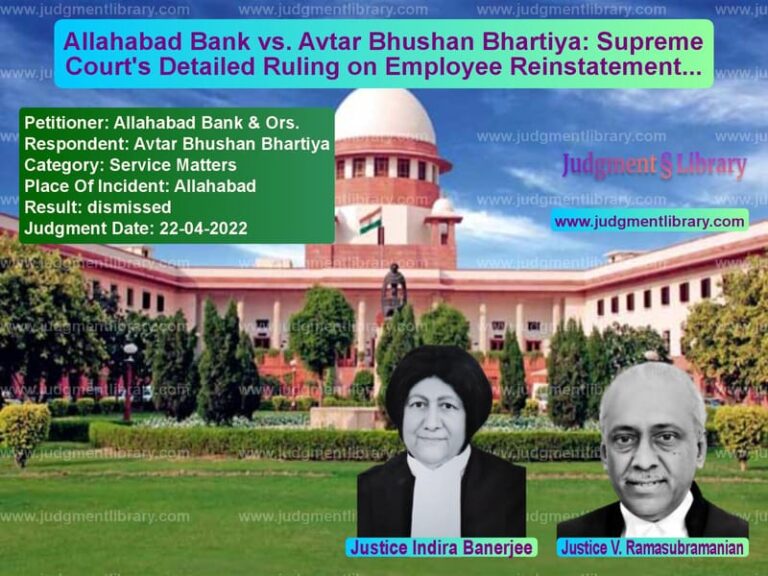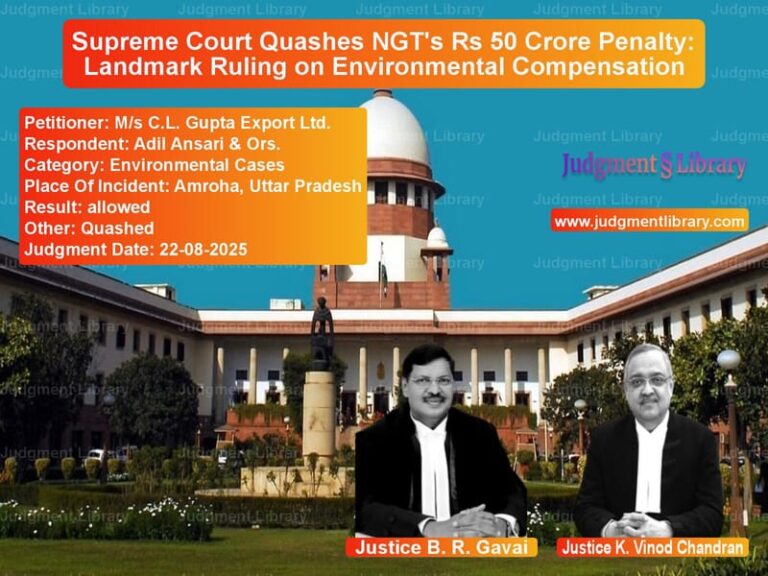Reservation in Promotions: Supreme Court’s Verdict on SC/ST Representation and Quantifiable Data
The case of Jarnail Singh & Ors. v. Lachhmi Narain Gupta & Ors. addresses a long-standing debate regarding reservations in promotions for Scheduled Castes (SCs) and Scheduled Tribes (STs) in government employment. This judgment, delivered by the Supreme Court of India, builds upon previous rulings and constitutional amendments, particularly focusing on the requirement of quantifiable data for granting reservations in promotions.
In Indra Sawhney & Ors. v. Union of India & Ors., the Supreme Court ruled that Article 16(4) does not provide for reservations in promotions. However, the decision was applied prospectively, ensuring that past promotions remained unaffected. Following this, the Constitution (Seventy-seventh Amendment) Act, 1995 introduced Article 16(4-A), which allowed reservations in promotions for SCs and STs if the state determined that they were inadequately represented.
Later amendments, including the Eighty-fifth Amendment, introduced consequential seniority for SC/ST employees who were promoted through reservations. However, the Supreme Court in M. Nagaraj & Ors. v. Union of India & Ors. ruled that states must collect quantifiable data proving both backwardness and inadequate representation before implementing reservation policies.
Arguments of the Petitioners
The petitioners argued that the state governments had failed to collect quantifiable data before implementing reservations in promotions. They contended that the reservation policy in promotions violated the fundamental rights of general category employees, as it granted undue seniority benefits to reserved category employees without adequate justification. The petitioners emphasized that reservations in promotions must be justified based on concrete data rather than assumptions.
Arguments of the Respondents
The respondents, representing the government, defended the reservation policy, asserting that SCs and STs remained underrepresented in public employment. They argued that historical discrimination and social disadvantages justified the continuation of reservations in promotions. Additionally, they pointed out that past judicial decisions recognized the need for affirmative action to ensure social justice.
Key Issues Considered by the Court
1. The Requirement of Quantifiable Data
The Supreme Court reaffirmed that reservations in promotions are an enabling provision, not a mandatory requirement. It ruled that states must collect quantifiable data proving the inadequate representation of SCs and STs in promotional posts. The court clarified that such data should be objective and verifiable, ensuring that reservations do not violate the principle of equality.
2. The Definition of ‘Cadre’ for Data Collection
The court clarified that quantifiable data must be collected at the cadre level, rather than for the entire service. This means that reservations in promotions should be granted based on the specific inadequacy of representation in a particular cadre, not based on overall numbers within the government workforce.
3. Proportional Representation and Adequacy
The court rejected the argument that the proportion of SCs and STs in the general population should automatically determine their representation in government services. Instead, it ruled that inadequacy must be assessed based on specific administrative data, not on broad demographic statistics.
4. Periodic Review of Reservation Policies
The Supreme Court emphasized that reservation policies in promotions must be reviewed periodically. The government must reassess whether reservations continue to be necessary based on updated data. The court left the determination of the review period to the discretion of the state.
5. Prospective Operation of the Judgment
The court ruled that the principles laid down in M. Nagaraj would operate prospectively. This was done to prevent the disruption of past appointments and promotions granted based on reservations. Retrospective application, the court noted, could lead to chaos and uncertainty.
6. Sampling Methods for Data Collection
The court ruled that the sampling methods used in the B.K. Pavitra II case were not appropriate for determining inadequacy of representation. It emphasized that data must be collected on a cadre-wise basis, rather than grouping multiple cadres together.
Key Observations from the Judges
In its judgment, the Supreme Court stated:
“Reservation in promotions must be justified on a case-to-case basis, supported by quantifiable data. It is not an automatic right but an enabling provision that must be backed by empirical evidence.”
The court also observed:
“The purpose of affirmative action is to correct historical injustices, but it must be balanced with efficiency and administrative necessity.”
Impact of the Judgment
This ruling has far-reaching implications for government employment policies. By mandating quantifiable data collection, the court ensures that reservations in promotions are based on empirical evidence rather than assumptions. The decision:
- Strengthens the principle of merit-based promotions while ensuring social justice.
- Prevents the misuse of reservations by making them subject to strict judicial scrutiny.
- Requires state governments to periodically review reservation policies based on fresh data.
Final Judgment
The Supreme Court upheld the principles laid down in M. Nagaraj and Jarnail Singh, emphasizing the necessity of collecting quantifiable data before implementing reservations in promotions. The ruling reaffirmed that reservations must be justified on a case-to-case basis and that the validity of reservation laws will be tested against these principles.
The case represents a landmark moment in India’s affirmative action policies. It balances the need for social justice with the principles of administrative efficiency and meritocracy, ensuring that reservations in promotions are granted only when necessary and supported by data.
Petitioner Name: Jarnail Singh & Ors..Respondent Name: Lachhmi Narain Gupta & Ors..Judgment By: Justice L. Nageswara Rao, Justice Sanjiv Khanna, Justice B.R. Gavai.Place Of Incident: India.Judgment Date: 28-01-2022.
Don’t miss out on the full details! Download the complete judgment in PDF format below and gain valuable insights instantly!
Download Judgment: jarnail-singh-&-ors.-vs-lachhmi-narain-gupta-supreme-court-of-india-judgment-dated-28-01-2022.pdf
Directly Download Judgment: Directly download this Judgment
See all petitions in Promotion Cases
See all petitions in Public Sector Employees
See all petitions in Recruitment Policies
See all petitions in Employment Disputes
See all petitions in Judgment by L. Nageswara Rao
See all petitions in Judgment by Sanjiv Khanna
See all petitions in Judgment by B R Gavai
See all petitions in dismissed
See all petitions in supreme court of India judgments January 2022
See all petitions in 2022 judgments
See all posts in Service Matters Category
See all allowed petitions in Service Matters Category
See all Dismissed petitions in Service Matters Category
See all partially allowed petitions in Service Matters Category

